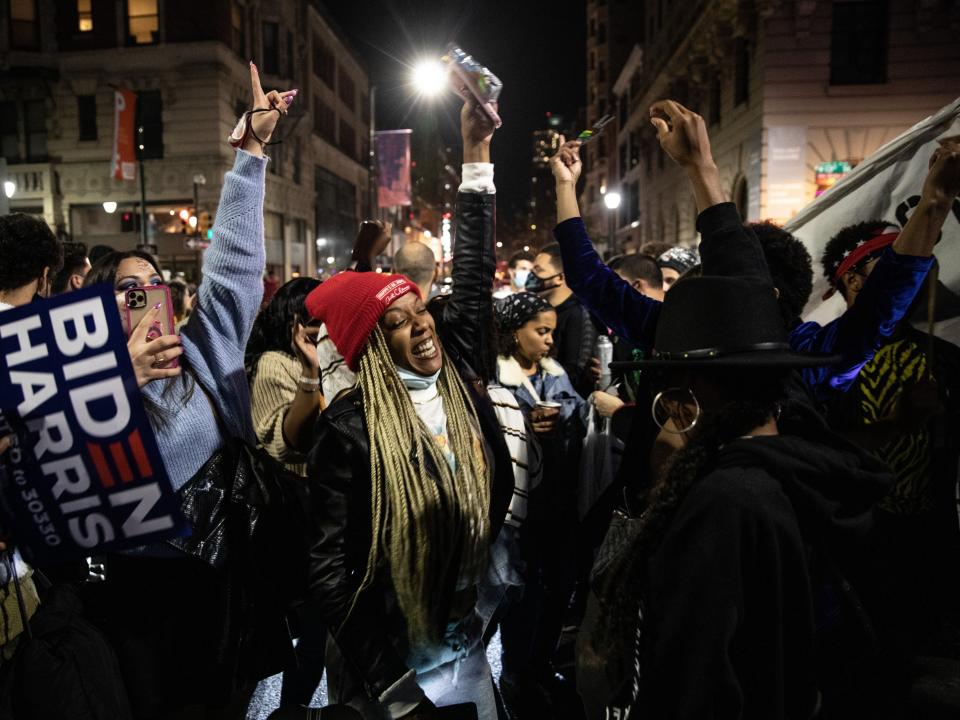Biden is the most popular president among college voters in at least 21 years

President Joe Biden is the most popular president among college student registered voters since the start of the Harvard Youth Poll 21 years ago. At 63 per cent, Mr Biden has the highest favorability rating among college voters of any president in the poll’s history.
Mr Biden has an approval rating of 59 per cent among the entire group polled, young Americans between 18 and 29 years old. That’s a huge step up for the president compared to this time last year when he was in the process of grasping the Democratic presidential nomination.
At that time, only 34 per cent of those polled in the age group approved of then-candidate Biden, according to the 2020 iteration of the Harvard poll.
Former Biden campaign youth vote adviser and the Harvard Kennedy School Institute of Politics polling director John Della Volpe told The Washington Post: “Joe Biden hasn’t really changed much but it’s like the ‘boy next door’ phenomenon: you take a second look and you see these qualities that you never appreciated before.”
“You knew he kind of had the same values but he shares much more of your values than you might have thought before, certainly in the way he thinks about government and America.
“People are responding to how quickly he’s been able to instil some of his values in the practice of government,” he added.
Other presidents have also received high approval ratings from college students registered to vote. George W Bush clocked in at 61 per cent in 2003 during his first term and Barack Obama reached a high of 57 per cent as his presidency was winding down in 2016.
Overall, among 18 to 29-year-olds, 65 per cent of respondents approved of how Mr Biden is handling the Covid-19 pandemic, and 57 per cent approved of he has managed race relations.
The poll also revealed that more young Americans are hopeful about the future of the United States than they were months into the Trump presidency in the fall of 2017. At the time, 31 per cent were hopeful about the future, while 67 per cent were fearful.
In 2021, 56 per cent of Americans are on the optimistic side, while 43 per cent said they were fearful.
In a memo by Mr Della Volpe, he wrote: “While the hopefulness of young whites has increased 11 points, from 35 per cent to 46 per cent, the changes in attitudes among young people of colour are striking.
“Whereas only 18 per cent of young Blacks had hope in 2017, today 72 per cent are hopeful (+54). In 2017, 29 per cent of Hispanics called themselves hopeful, today that number is 69% (+40).”
The polling was done before the announcement of the guilty verdict of Derek Chauvin, the former police officer convicted on 20 April of murdering George Floyd on 25 May 2020.
Mr Della Volpe added: “It wasn’t long ago at all that a supermajority of young Black Americans – and almost as many Hispanic Americans – would tell me that they felt under attack in America simply because of the colour of their skin.”
Former president Trump fares much worse in the poll, with only 28 per cent having a favourable view of him. Almost two-thirds, 65 per cent, of young Americans have an unfavourable view of Mr Trump.
The poll also found that Americans in the age group are more open-minded and politically engaged than the same age group were a decade previously. The group now also prefer big government solutions to problems.
Thirty-six per cent of young Americans said they were politically active, with young black voters topping that category with 41 per cent saying they’re politically active. In 2009, 24 per cent of young Americans said they were politically active.
“By a margin of nearly three-to-one, we found that youth agreed with the sentiment, ‘Americans with different political views from me still want what’s best for the country’ — in total, 50% agreed, 18% disagreed, and 31% were recorded as neutral,” Mr Della Volpe noted.
He added: “There’s zero question that there’s was a significant generational shift when Generation Z’ers came into the election on every issue supporting a bolder, strong government.”
The Pew Research Centre has defined Generation Z as “anyone born from 1997 onward”.
Read More
Biden working group targets jobs for fossil fuel communities

 Yahoo Movies
Yahoo Movies 